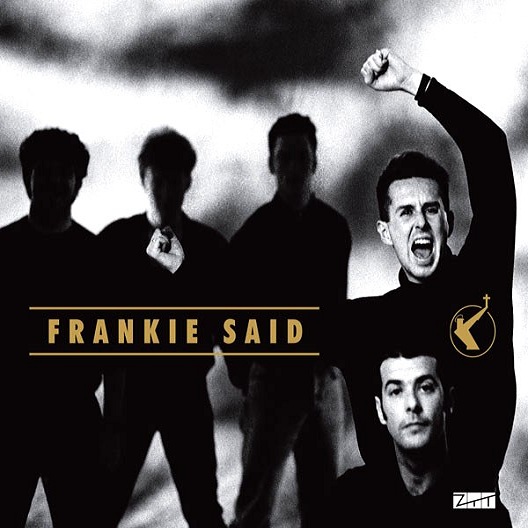20 reasons why Frankie Goes To Hollywood were completely amazing, and why this compilation is essential to understanding just a fragment of the impact they had.
One.
As I write this it was, to paraphrase some other Liverpool-based hitmakers, 30 years ago today when ‘Relax’ was number one.
Two.
In 1984, Nasher said that people would be playing ‘Relax’, and it would still be on jukeboxes, in 50 years time. His observation is, so far, proving accurate.
Three.
A couple of gents who’d served time in the punk years, get together with some proper scallies (the sort of gang who’d either knife you or fuck you) and form a band. Their early shows featured women in cages, a good half decade before the Beastie Boys turn up. Nobody seems to be wearing very much other than denim, leather and jaunty harnesses.
Four.
The boring and factual "leave the obvious to the TV pundits" observations about The Tube. Trevor Horn. The Blockheads. Mike Read. Being banned by the BBC. Blah blah blah.
Five.
My first introduction to Frankie Goes To Hollywood was the fruity 16 minute mix of ‘Relax’ that was essentially lots of samples of zips and "water". I can’t say that at the age of 13 I was fully aware of what was going on, but something most definitely was. When I got around to see the video, it shed light – though not much light, dark rooms are dark for a reason – on a vision of SICK FILTH unseen before. It was probably my Starman moment. It was probably quite a few people’s Starman moment. This wasn’t the casual draping of an arm around another man. This was dirty and butch and involved a tiger.
Six.
I eventually buy the seven inch single, and spend an hour or two staring and absorbing the sleeve.
Seven.
Frankie Goes To Hollywood as the first act to launch Zang Tuum Tumb was like if Virgin had launched with the Sex Pistols. ZTT helped manufacture them into an amazing thing. A last hurrah and accumulation of all the brilliance and invention of the post-punk and perfect pop years, before pop music got all issue-based, serious and people like Simple Minds donned the billowy coats of problem rock.
Eight.
‘Two Tribes (Annihilation Mix)’ is probably the highest point of eighties 12 inch culture. Nine minutes of drama, sirens, funk, fear and excitement. In a perfect world, it would spend nine weeks at No.1. Summer 1984 – with ‘Relax’ climbing back up to No.2 – seemed like a perfect world, especially one where a pansexual juggernaut was beating off Prince, Wham! and The Smiths. For any teenager in 1984, it certainly felt like the world could go up in nuclear flames at any point, to the extent that I timed if I could run back home within a four-minute warning. ‘Two Tribes’, with such darkly intoning quotes from the Protect & Survive booklet, coupled with that year’s nuclear bomb drama Threads, exacerbated that paranoia.
Nine.
Paul Rutherford’s job description: "I came to dance".
Ten.
‘The Power of Love’. Not even the wet acoustic cover of recent years can dim its majesty. A sentiment such as "I’ll protect you from the Hooded Claw" is all you need in a love song.
Eleven.
The fourth number one that wasn’t – ‘Welcome To The Pleasuredome’ – is the underdog of this tale. What seemed like excess and pretentious guff on the album, is remade into a propulsive banger. It has come out in the intervening years, and removed it’s "only No.2" shame to evoke the entire Frankie ethos in one song.
Twelve.
Hearing their cover of ‘Born To Run’ (featured here, live on The Tube) before I ever heard the original, I thought theirs was far better.
Thirteen.
Sitting up all night to watch the Montreux Pop Festival thing where they performed ‘Rage Hard’ and ‘Warriors Of The Wasteland’. They trashed the stage while the tape still ran. Holly summed it up as thus "Didn’t we have a party. Didn’t we have a good time?" It was a new level of excitement, even if the eventual album Liverpool was a little ropey and dated a bit quicker, lines like "they make the masses kiss their assets" are timeless.
Fourteen.
Watching The Wildlife became a soundbed for late eighties TV trails. The oomph was still there, if not quite the edge. The Top Ten was becoming a stranger. Things were going awry in the court of Frankie.
Fifteen.
"HAH!"
Sixteen.
And that is about the dimensions of it. They came in with a BANG and limped out somewhat. Sometimes something so intense, glorious and high pressured and huge as those first 18 months can wreak damage. Maybe the band weren’t built to last, but they left a handful of songs that most certainly were.
Seventeen.
They may be dismissed as being as manufactured as The Monkees or One Direction, but sometimes you need reminding that perfection doesn’t always fall fully formed from the sky. It occasionally needs a hand.
Eighteen.
Frankie Said is exactly that. What they said, what they looked like while they were saying it and how they went about it. You can’t really argue with an album that contains some of the greatest – and biggest selling – moments of pop history.
Nineteen.
They are no longer the artists, they have become a work of art.
Twenty.
BANG.


